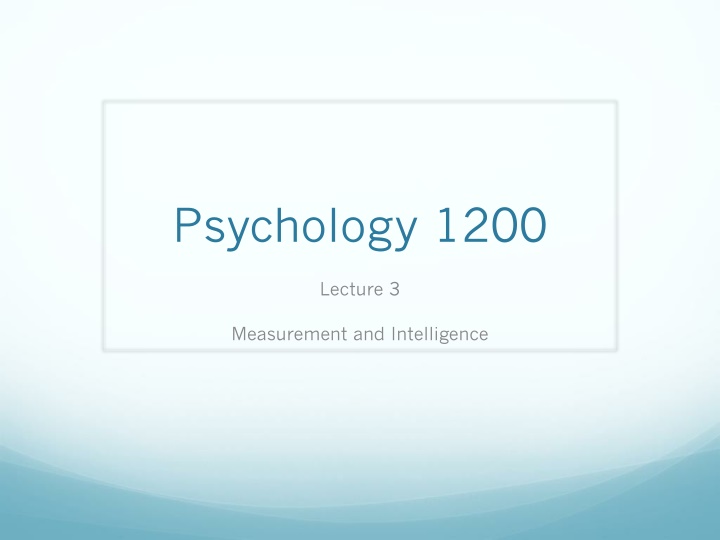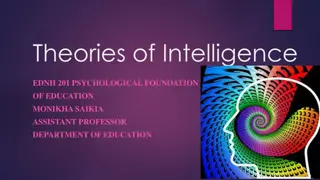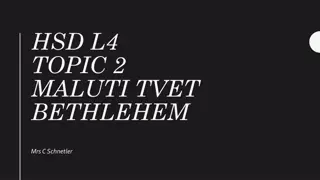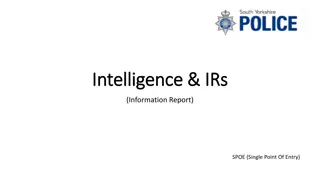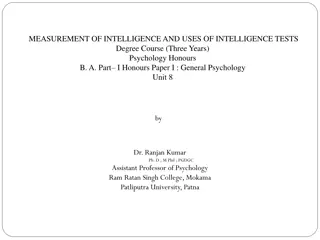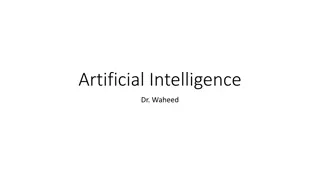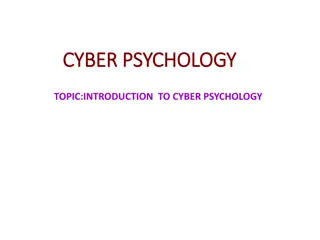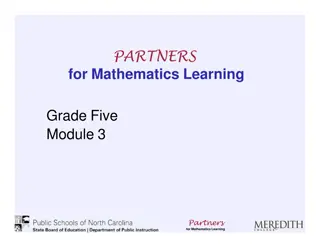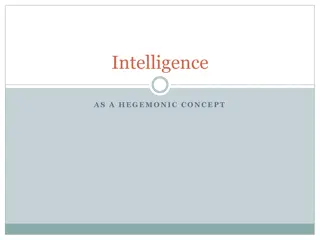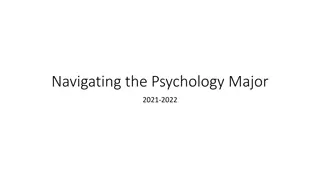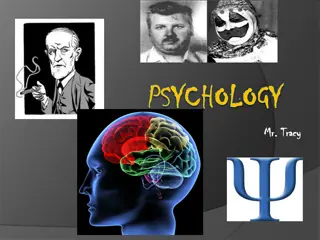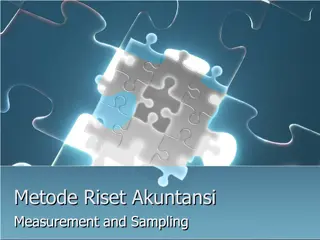Measurement and Intelligence in Psychology
Measurement problem in psychology, specifically how we justify tests as measures of constructs like intelligence. Dive into the concept of Operationism and the different definitions of IQ, including Stern and modern methods. Understand the complexities of defining intelligence and how it relates to standardized tests.
Download Presentation

Please find below an Image/Link to download the presentation.
The content on the website is provided AS IS for your information and personal use only. It may not be sold, licensed, or shared on other websites without obtaining consent from the author.If you encounter any issues during the download, it is possible that the publisher has removed the file from their server.
You are allowed to download the files provided on this website for personal or commercial use, subject to the condition that they are used lawfully. All files are the property of their respective owners.
The content on the website is provided AS IS for your information and personal use only. It may not be sold, licensed, or shared on other websites without obtaining consent from the author.
E N D
Presentation Transcript
Psychology 1200 Lecture 3 Measurement and Intelligence
Measurement The measurement problem in psychology How do we justify the test, t, is a measure of construct C? How do we justify that an IQ test is a measure of intelligence? Do you ever think about How do we justify that a ruler is a measure of height? Why not?
Measurement The justification is given in a manner that you will probably find odd and unfamiliar. There are 4 possibilities: 1. Intelligence is what it says it is in the dictionary. 2. My theory is that intelligence is this is my reason for that view . 3. Intelligence is IQ or g. 4. My theory is that intelligence is this is the evidence for that view . Which method do we use in psychology?
Operationism What something is, is given by the technical definition of it (method 3). We make up technical definitions. They have 4 features: 1. Clear 2. Unique 3. Public & shared 4. Fairly stable over time For example we are not interested in water, that is not technically defined. We make up H2O and define it technically. We are not interested in intelligence, that is not technically defined. We make up IQ or g and define it technically.
IQ Two definitions: Stern and modern. Stern (ratio IQ): IQ=MA/CAx100. Modern (deviation IQ): IQ = 15{(x- )/ } + 100 Where: = the mean of the norm group = the standard deviation of the norm group X = the individual s score on the intelligence test
Modern Method: Example Now imagine that an individual Canadian male writes the test and gets 64% correct. We see from the formula that their IQ would be: IQ = 15{(64-64)/3} + 100 The result is 100. So when an adult scores the same as the norm group their IQ is 100. This is why the average IQ is 100....it is DEFINED to be this way. Now imagine that an individual Canadian male writes the test and scores 67%. Their IQ would be: IQ = 15{(67-64)/3} + 100 The result is 115.
Modern Method: IQ Is the definition clear? Is it public and shared? Is it relatively stable over time? Is it unique? There are well over 20 accepted IQ tests currently in use The norm group is not defined for any individual Conclusion: According to operationism, the definition of IQ is not ideal we all have multiple IQ s .by definition.
Modern Method: Reliability Validity vs reliability Reliability of IQ tests between .75 and .9 Reliability of physical measures your height
Enough About IQOn to Intelligence In operationism IQ is NOT intelligence! But we ARE interested in intelligence what to do? In construct validity (method 4), intelligence is what the evidence tells us it is (called the data driven method in the text). Guiding principle: What something correlates with tells us what it is.
The Method of CV Theory 1) Develop a THEORY about what a construct is: Intelligence is a multidimensional ability 2) Based on this theory, hypothesize that abilities like memory, language use, problem solving, understanding others, creativity, math, physical coordination, etc., should correlate with each other. 3) Develop an assessment of all of these abilities. 4) Give this assessment to a large number of subjects. 5) If the assessments of individual abilities correlate with each other, conclude that our THEORY that intelligence is a multidimensional ability. IMPORTANT: We have a definition of IQ and THEORIES OF INTELLIGENCE.
The Principles of Construct Validation 1) The more evidence we gather, the more validated the test or construct becomes. There is no such thing as the end of validation we can always gather more evidence. Not all interpretations of the evidence will be the same. Therefore, there will almost always be competing theories about what a test measures. This is why we have multiple theories of intelligence or multiple theories of addiction . We do not agree on how to interpret the evidence. There is no such thing as an index of validation. There is no such thing as a measure of how valid a test is as a measure of a construct. If the test correlates with what it should correlate (if it were a measure of what we claim it measures), we say the test has convergent validity as a measure of the construct we claim it measures. If the test does not correlate with what it should not correlate (if it were a measure of what we claim it measures), we say the test has discriminant validity as a measure of the construct we claim it measures. 2) 3) 4) 5) 6)
Discussion Question 3 Critique the following video as I did in my critique of the video in lecture. Critique does not mean here Be critical of or Criticize . It means evaluate the video from the point of view of the theory you have learned in lecture. You are free to make any critique you wish. Look at the critiques of other students and engage in discussion about the validity of their positions. DO NOT SAY THINGS LIKE . I loved your critique Fred, it was really cool how you said . The exercise here is not to love or hate the things that Fred says ok. A critique of an argument is not a first person avowal of your feelings, whether valid or not, about the things someone said or did. The object is to evaluate, discuss, assess, challenge, provide a different point of view, question premises or conclusions, etc. Be polite but not ingratiating or superficial ok.
Discussion Question 3 The video is below enjoy!
